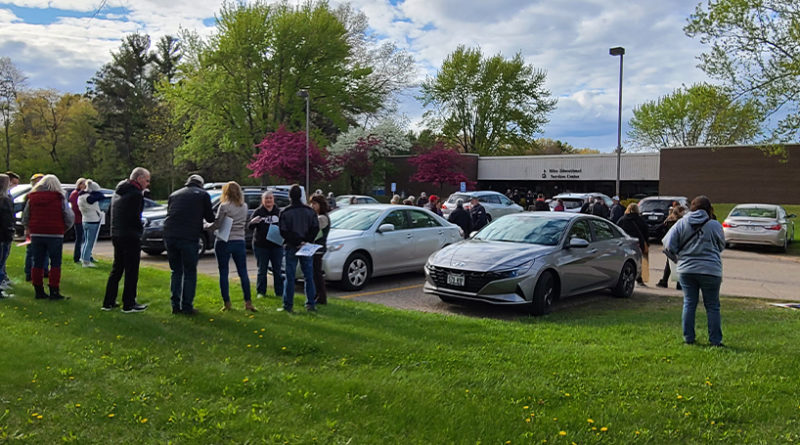Editorial: School board’s apparent ease at shutting out public is alarming
By Brandi Makuski
It could’ve been a totally different story.
If the school district had not closed the building, it could have painted the 70 or so people in attendance Monday night as a group of uneducated extremists, or perhaps armchair quarterbacks, looking for another avenue to complain about government overreach. Once they’ve said their piece, they’ll file out of the room, satisfied they’ve made some mark on history and disinterested in the remainder of business on the board’s May 10 meeting agenda.
But by closing Bliss Educational Services Center without warning minutes prior to Monday’s school board meeting, the district instead created not only a watershed moment but also a narrative; one that actually underlines concerns many protesters expressed that night: to protect our democracy, we simply need to shut out the public.
About an hour before Monday night’s school board meeting, Cory Hirsbrunner, assistant superintendent, told this reporter that the district was aware the group planned to attend the meeting, unmasked, and an overflow room was being prepared for those individuals at Ben Franklin Jr. High, which is located on the other side of the block from Bliss. During that phone call, Hirsbrunner said that those wanting to address the board in person would still be able to do so, provided they were in the meeting room at Bliss.
But at some point after that phone call, the decision was made to close Bliss to the public. A one-way live stream of the meeting was offered at Ben Franklin, as promised, but there would be no public comment that night. Superintendent Craig Gerlach promised a phone call offering a more detailed explanation following the meeting. That call never came.
Also, the district never announced the change in venue on its Facebook page or website, nor did it distribute the information to the press. The new location was announced solely via a sign placed on the front door of Bliss.
Several feet in front of the entrance, Assistant Police Chief Bob Kussow, with some of his officers in tow, explained that SPPD had no intention of citing or arresting anyone for entering the building without wearing a mask.
Could the lack of support from the police be the reason the district decided to close the building?
For a moment, forget about masks. Forget the myriad of recall attempts and lawsuits against school boards across the nation. Forget about Pacelli Catholic Schools—that district might require masks, but it remained open for in-person instruction five days a week during the pandemic, with less than five percent of the system’s families utilizing the e-learning option offered by the Catholic school system administration (What’s their magic recipe that seemingly eludes the public school district?).
What happened Monday night pushed this issue beyond the district’s mask policy. What happened Monday night was, an elected body decided to shut down a public building minutes prior to a public meeting. They decided to restrict constituents’ access to their elected representatives, offering no acknowledgment that’s what they’d achieved or any apology for having done so. To pretend this is a mask issue, or anything else, would be disingenuous.
Board President Meg Erler explained in her opening remarks on the evening of May 10 that the board decided to “waive” public comment “due to the unique circumstances” during the meeting, despite a specific agenda item allowing for public comment during the meeting.
Ms. Erler and the rest of the elected board members should take note that arbitrarily changing the rules for public access or input does not a democracy make. If the district opts to close Bliss over the “unique circumstances” of a mask protest, is there any issue being protested under which they would not close the building in the future? Considering the ease with which the district did so Monday night, voters shouldn’t feel secure that it won’t happen again.
If the district still includes any measurable civics education in its curriculum, hopefully, its social studies teachers will use this instance in their classrooms as an example of—perhaps unintentional and temporary—oligarchy: a few well-connected individuals ruling over those they were elected to serve. And never before in this reporter’s career has the board wielded power such as it did on Monday.
Many in attendance at Monday’s protest promised to file a complaint with the Portage Co. District Attorney’s Office. If it is decided the board didn’t violate the actual letter of the law, no one can argue the board didn’t trample on the spirit of it, and in a very public manner.
That’s the wrong message to send the public, the voters, and the children who one day will be leaders in our community.



